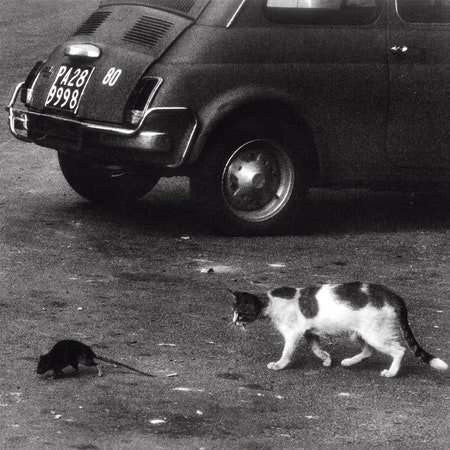It’s tempting, in the aftermath of Westside Gunn’s purported swan song And Then You Pray for Me, to consider Griselda’s dissolution. Gunn is now, by his own account, more interested in fashion and moguldom than recording or performing—the Art Basel crowd, it happens, has little use for Trap-A-Holics tributes. His half-brother Conway the Machine, meanwhile, is still rapping like the rent’s due. The group’s most accomplished and pragmatic technician, Conway offsets sleek major-label outings with austere works for hire, his sprawling solo catalog eschewing a neat trajectory. He cuts hard-boiled tapes with neighbors, unsung DJs, and streetwear brands, a master sculptor insisting upon the bluntest of tools.
Conway sticks largely to genre conventions on Palermo, although producer Wun Two makes a valiant effort to break the mold. A German beatmaker best known for his lo-fi instrumental projects, Wun Two conjures an assured, hypnotic mood reminiscent of DJ Muggs. Where past collaborators Big Ghost Limited and the Alchemist outfitted Conway with ornate samples, Wun Two foregrounds distinctive percussion, washing his drum patterns with isolated chords and hazy stereo effects. On “Carduni,” ambient cymbals approximate uncanny static; a delicate melody sneaks in around the halfway point of “Mind Tricks,” propelling the track forward while maintaining its creeping tension.
A series of interludes embellishes the ambience with a transatlantic drug trafficking theme, but Wun Two’s cues are lost in translation. Conway stays close to home, his tales of ascendance—I used to do X, now I do Y—often confined to individual couplets. The anecdotes range from amusing (“Look, we was baggin’ all day to serve in the spot/We had shit jumpin’ like Shawn Kemp’s vertical hops”) to obligatory (“Used to bag ounces up in twenties, I would scrape the plate/Chop until the razor break, look, they say he great”), his rhyme patterns rigid and monosyllabic. The performance is buoyed by Conway’s instincts, which are, as ever, exceptional. He stretches his limbs in whitespace, lounging in the drawn-out chorus of “Carduni,” extending the outros of “Mind Tricks” and “Bianca” into ad-libbed monologues.
There’s precious little rapping on Palermo—most tracks feature a single verse with padding on either side—and Wun Two relishes the lack of structure, his unhurried tempos blooming into roomy instrumental breaks. In lieu of quotables, he centers the performers’ expressive quirks: Conway’s Heath Ledger-as-Joker cackle does as much lifting as the sinewy rhymes. Fellow Buffalo native Goosebytheway is an invaluable supporting player, warbling raspy hooks like a grizzled 50 Cent. Still, the tasting-course format imposes a low ceiling. The diffuse jazz-club instrumentals on “Cold Dish” are among the album’s most evocative, yet Conway seems to lose interest midway through a sparse 16 bars. Goose bookends the verse with a loose chorus, but it plays like a reference track, more of a teaser than a song.
